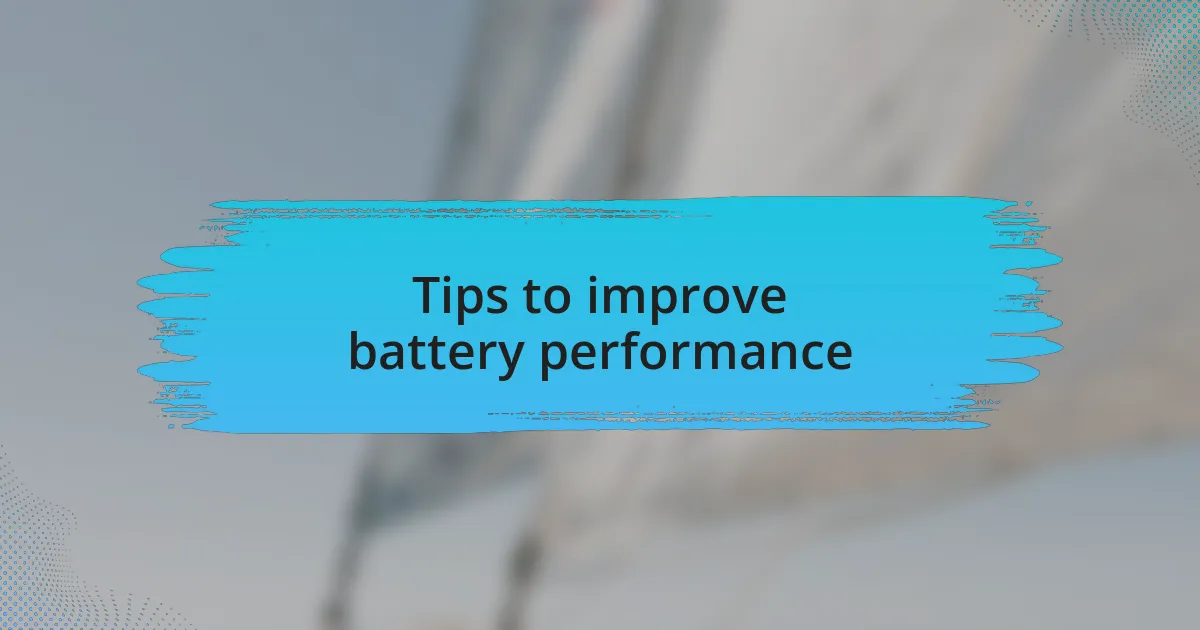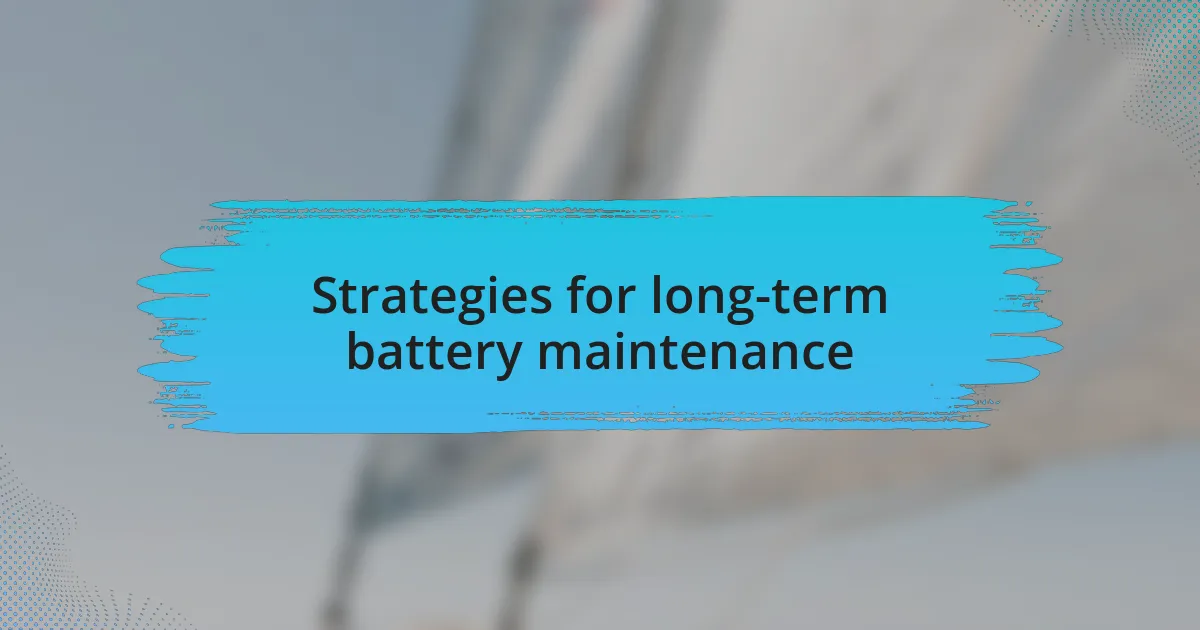Key takeaways:
- Battery performance is influenced by factors such as temperature, age, and power consumption habits.
- Upgrading to lithium-ion batteries can enhance efficiency and reliability on yachts.
- Regular maintenance, including checking connections and avoiding deep discharges, is crucial for extending battery life.
- Implementing a battery management system optimizes charging cycles and enhances overall power management.

Understanding battery life in yachts
In my experience, understanding battery life in yachts is about more than just knowing how long it lasts; it’s about grasping how to maximize that potential. There’s something undeniably satisfying about watching the battery gauge hold steady while savoring those peaceful moments on the water, knowing your lights and systems are enduring with you.
Have you ever been anchored out, only to realize the battery power was slipping away faster than you anticipated? I remember a particular sunset cruise when I ignored my battery levels. That evening ride, while undoubtedly beautiful, turned into a race against time to conserve energy, making me acutely aware of how essential it is to monitor power consumption.
The type of battery installed also plays a crucial role in performance and longevity. When I upgraded to lithium-ion batteries, I could feel the difference: faster charging times, less weight, and enhanced reliability. It’s like giving your yacht a new lease on life, turning battery management from a chore into an empowering part of the sailing experience. Don’t you think having that peace of mind when you’re out at sea is invaluable?

Common factors affecting battery life
Battery life on luxury yachts is influenced by several common factors, each playing a significant role in performance. For instance, the temperature can have a dramatic impact; I recall a summer trip when soaring temperatures caused my batteries to drain much faster than usual. It was a stark reminder that keeping batteries at optimal temperatures isn’t just a maintenance tip – it’s crucial for maximizing their lifespan.
Another common factor is the age and condition of the battery itself. I remember replacing an older lead-acid battery that had seen better days. The difference in performance was astounding; the new one delivered consistent power and charged more efficiently. Have you ever experienced that moment when a simple upgrade transformed your daily sailing excursions? It’s in those moments you truly appreciate the importance of timely replacements.
Lastly, the way power is consumed on board matters. I’ve had nights where energy-hungry devices drained my battery while I was oblivious to how much power they were using. Being mindful of what systems you run simultaneously can mean the difference between enjoying a serene night under the stars or cutting your journey short. Isn’t it intriguing how small adjustments can lead to significant improvements in battery life?

Tips to improve battery performance
When it comes to enhancing battery performance on luxury yachts, I’ve found that regularly checking connections and terminals can make a significant difference. One trip, I noticed that my yacht’s batteries were underperforming. A quick inspection revealed some corrosion on the terminals. Cleaning those connections not only improved efficiency but also gave me peace of mind knowing that my power system was in good shape.
I’ve also learned the importance of avoiding deep discharges. There was a time when I pushed my batteries to their limits, thinking they could handle it. After realizing how quickly that led to reduced performance, I committed to recharging them well before reaching those lower thresholds. It’s truly fascinating how respecting the battery’s capacity not only prolongs life but also keeps my adventures uninterrupted.
Additionally, employing a battery management system has been a game changer for me. When I first installed one, I was amazed at how it optimizes charging and discharging cycles. It’s like having a personal assistant that keeps track of my energy use! Have you ever experienced the relief of knowing your yacht is running smoothly without the constant worry of battery issues? It’s all about investing a little effort upfront for the enjoyment of seamless sailing later on.

Strategies for long-term battery maintenance
To ensure the longevity of your yacht’s batteries, I’ve found that seasonal maintenance checks are essential. Each spring, I take the time to thoroughly inspect battery water levels, especially if you have lead-acid batteries. It’s surprising how a little added water can make such a difference; I’ve witnessed a noticeable boost in performance after just a few minutes of maintenance. Have you ever considered how much of a difference that little task can make?
Keeping batteries charged to optimal levels is another key strategy I practice. I remember a particularly long trip where I didn’t pay attention to the charging cycles. When the batteries dipped too low, it was a mad scramble to find shore power before running out completely. Since then, I’ve made it a point to keep a close eye on the charge, believing that every time I prevent a discharge cycle, I’m investing in my yacht’s future.
Lastly, I cannot stress enough the value of temperature control. During one summer cruise, I learned the hard way that extreme heat could degrade battery life. After that experience, I started shade-proofing my battery areas and avoiding direct sunlight. This simple adjustment has not only added years to the lifespan of my batteries but also gave me a level of comfort knowing I’m doing everything I can to protect my investment. How do you currently maintain your yacht’s battery temperature?